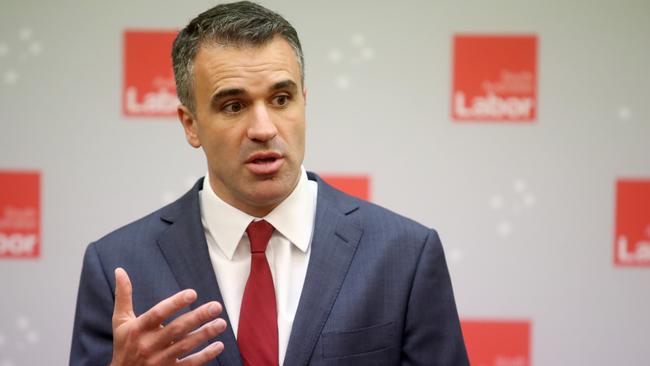Labor to block council rate capping in SA, reveals new plan to end ‘waste and rorts’
LABOR has announced it will block Premier Steven Marshall’s controversial plan to cap council rates and is instead proposing its own reforms to crack down on “waste and rorts”.
Analysis below: Defeats feed next campaigns
- Homeowners ‘would have saved $500 this year with rate capping’
- Details revealed on plan to limit council rate rises
- Council rates rise at almost three times rate of inflation
LABOR has announced it will block Premier Steven Marshall’s controversial plan to cap council rates, and is instead proposing its own reforms to crack down on “waste and rorts”.
Opposition Leader Peter Malinauskas made the announcement on Thursday, flanked by MPs from SA Best and the Greens who together give Labor the numbers in the Upper House
to block the legislation.
Mr Malinauskas said the State Government was yet to reveal what limit it would put on rate rises, and Labor did not want to “limit the capacity of councils to deliver vital services”.
The Labor scheme would impose new scrutiny on expenses and travel by councils.
There would be new requirements to publish council budget plans, including forecasts on the impact of rates from any spending over $1 million.
“Extravagant perks” for chief executives would be banned, with compensation packages limited to salary and essential tools.

Mirroring transparency measures imposed on state MPs, councillors and staff would be forced to publish credit card statements and deliver reports justifying travel spending.
A “local government commissioner” would be appointed to mediate complaints and disputes.
Mr Malinauskas said the Government plan would do “nothing to tackle the core problems of council waste, secrecy and rorting”, dismissing rate capping as a slogan devoid of policy.
“Labor’s comprehensive bill will deliver real results in protecting ratepayers from cost of living increases and tackling the outrageous waste and rorts at some councils,” he said.
“We have undertaken extensive consultation on this bill, which will end the waste and rorts and deliver unprecedented transparency and independent scrutiny of council budgets.”
Local Government Minister Stephan Knoll said Mr Malinauskas had put politics ahead of people.
“It’s a slap in the face to the overwhelming majority of South Australians who support rate capping and the Government’s plan to lower the cost of living,” he said.
The Local Government Association opposes rate capping, but said it is open to other reform.
LGA President Sue Clearihan welcomed Labor’s opposition to rate capping.
“Metro rate increases this year were lower than CPI, and a fraction of increases to state taxes such as the NRM and solid waste levy,” she said.
Cr Clearihan said some of the reforms Labor had proposed were “consistent” with reforms the LGA has previously proposed.
“However, some of the proposals put forward appear excessive given the extensive accountability, integrity and oversight measures already in place across local government.”
Greens MP Mark Parnell said rate capping was “bad public policy that risked creating harm to local communities while doing nothing to improve accountability or transparency.”
SA Best MP Connie Bonaros said the State Government was “on notice”.
“The public have been sold a dud deal,” she said.
“The Government’s rate capping bill is nothing more than a populist move and a desperate grab for votes at the last election.”
Mr Malinauskas agreed it was possible for the Government to accept the transparency plan, as a suite of reform measures separate to its plan to put a cap on total council rates.
The Labor and crossbench plan will be introduced to Parliament before the end of the year.
The Essential Services Commission of SA is currently considering where the state’s first council rate cap would be set, and is considering consumer inflation as well as other figures.
Council rates have increased at three times the rate of inflation over the past decade.
Mr Knoll has called for this year’s local government elections, in November, to become a “referendum” on the need for council rate capping.
Analysis
DEFEATS FEED NEXT CAMPAIGNS
By Daniel Wills
ANOTHER signature election pledge from the State Government looks certain to bite the dust as council rate capping is filed in a bottom drawer next to more shop trading hours.
On both, Labor and Upper House crossbenchers are just keeping their word to voters.
The Opposition, SA Best and Greens all went to the election telling people they had clear positions to do absolutely nothing on rate caps or shops.
Premier Steven Marshall has made much of his “mandate” to pursue the policies, but parties standing against him can use exactly the same claim to justify their opposition.
Labor and the crossbench have ensured these issues stay alive, right to the next election.
While the Government would rather deliver its reforms, ministers can see mileage in their defeats. Polls suggest the public wants rate capping and more shopping, and they can’t wait to campaign on it. Mr Marshall could have the first two pillars for a campaign in 2022 if he not only seeks to hold seats but adds more in the Upper House, as everyone from Labor to SA Best is painted as an obstacle to populist change.
